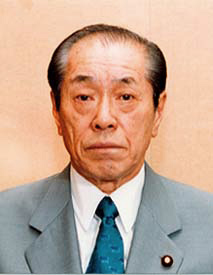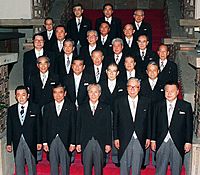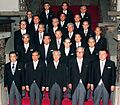Hiromu Nonaka facts for kids
Quick facts for kids
Hiromu Nonaka
|
|
|---|---|
|
野中 廣務
|
|
 |
|
| Member of the House of Representatives | |
| In office August 8, 1983 – October 10, 2003 |
|
| Preceded by | Shigesaburo Maeo Sen'ichi Tanigaki |
| Succeeded by | Hideo Tanaka |
| Constituency | Kyoto-2 until 1993 Kyoto-4 from 1993 |
| Head of the Okinawa Development Agency | |
| In office January 14, 1999 – October 5, 1999 |
|
| Prime Minister | Keizo Obuchi |
| Preceded by | Kichio Inoue |
| Succeeded by | Mikio Aoki |
| Chief Cabinet Secretary | |
| In office October 5, 1998 – July 30, 1999 |
|
| Prime Minister | Keizo Obuchi |
| Preceded by | Kanezo Muraoka |
| Succeeded by | Mikio Aoki |
| Minister of Home Affairs and Head of the National Public Safety Commission | |
| In office June 30, 1994 – August 8, 1995 |
|
| Prime Minister | Tomiichi Murayama |
| Preceded by | Hajime Ishii |
| Succeeded by | Takashi Fukaya |
| Personal details | |
| Born | October 20, 1925 Sonobe, Kyoto, Japan |
| Died | January 26, 2018 (aged 92) Shimogyō-ku, Kyoto, Japan |
| Political party | Liberal Democratic Party |
Hiromu Nonaka (野中 廣務, Nonaka Hiromu, 20 October 1925 – 26 January 2018) was an important Japanese politician. He was a member of the Liberal Democratic Party (LDP).
Nonaka served in local politics in Kyoto Prefecture from 1951 to 1978. Later, he became a member of the House of Representatives from 1983 to 2003. He was one of the most well-known politicians in Japan during the 1990s.
He held several important government jobs. These included Minister of Home Affairs and Head of the National Public Safety Commission from 1994 to 1995. He was also Chief Cabinet Secretary from 1998 to 1999. In 1999, he was Head of the Okinawa Development Agency. Many people saw Nonaka as a wise and powerful figure in Japanese politics. Some even thought he was the most powerful person in Japan in the mid-to-late 1990s.
Contents
Early Life and Political Beginnings
Hiromu Nonaka was born on October 20, 1925, in Sonobe, Kyoto Prefecture. This area is now part of Nantan city. His family faced some discrimination in society.
After finishing junior high school in 1943, Nonaka worked for the Japanese National Railways (JNR). He worked in Osaka. A future prime minister, Eisaku Sato, managed that office at the time.
Nonaka experienced unfair treatment when he was young. This experience made him decide to leave JNR and enter politics. He started in local politics in Sonobe. He was a member of the local assembly from 1951 to 1958. Then, he became the mayor from 1958 to 1966.
After that, Nonaka won a seat in the prefectural assembly of Kyoto Prefecture. He served there from 1967 to 1978. For a short time in 1978, he was the vice-governor of Kyoto Prefecture. He later left this role to create Japan's first care facility for people with severe physical disabilities. He also served as its chairman.
National Political Career
Nonaka joined the House of Representatives in 1983. He won a special election for the Kyoto 2nd district. This election happened after two representatives passed away. Sadakazu Tanigaki, the son of one of the former representatives, won the most votes. Nonaka came in second.
In the 1980s, Nonaka was part of a political group led by Prime Minister Noboru Takeshita. This group belonged to the Liberal Democratic Party (LDP). In 1988, Nonaka became more well-known after some political challenges affected Takeshita's group.
The 1993 general election was a big change. For the first time in many years, the LDP became the opposition party. Not many LDP members had experience being in the opposition. Nonaka used his past experience from local politics in Kyoto to become a strong critic of the government. This government was led by Morihiro Hosokawa.
After the Hosokawa government ended in 1994, Nonaka joined the Cabinet. He became part of the government led by Tomiichi Murayama.
Nonaka served as Minister of Home Affairs during the Tokyo subway sarin attack in 1995. He gained attention for personally apologizing to a person who was wrongly accused in connection with the attack.
In 1998, Prime Minister Ryutaro Hashimoto asked Nonaka to visit China. Nonaka went to express regret to victims of a past historical event. Later that year, when a Chinese leader asked for more apologies, Nonaka said the issue was "finished."
In 1998, Nonaka was appointed Chief Cabinet Secretary under Prime Minister Keizō Obuchi. In this role, he had a lot of influence. Many people inside the government saw Nonaka as a hidden leader. He helped arrange a big plan to help banks. He also brought another political group into the government. A TIME magazine article in December 1998 called Nonaka "Japan's most powerful man."
In 2000, as the LDP's secretary-general, Nonaka played a key role. He helped defeat a vote that could have removed Prime Minister Yoshiro Mori from power.
In 2001, Nonaka was considered a possible candidate to become the leader of the LDP. If he won, he would likely become the Prime Minister of Japan. Nonaka was hesitant because it would highlight his background. During his possible candidacy, future Prime Minister Tarō Asō reportedly made comments that Nonaka found offensive. Nonaka later said he would "never forgive" Asō for these comments. Asō denied making them in 2005. Nonaka eventually supported Ryutaro Hashimoto in the election. However, Hashimoto lost to Junichiro Koizumi.
Koizumi's political style changed how LDP groups worked. Nonaka strongly disagreed with Koizumi being re-elected as LDP president in September 2003. He said that this election would decide if Japan would "survive or go into decline." After Koizumi won again, Nonaka announced he would retire from politics in October 2003. He did not run in the 2003 general election. However, he did campaign for the LDP candidate in his home district in Kyoto Prefecture.
After Retirement
After leaving the House of Representatives in 2003, Nonaka became chairman of a powerful group that supported the LDP. In 2009, the Democratic Party of Japan formed the government. In 2011, Nonaka left the LDP. He said he wanted to remain neutral. However, he rejoined the LDP in 2016.
On June 5, 2013, Nonaka led a group, including former Prime Minister Yukio Hatoyama, to Beijing. They met with a Chinese official. Nonaka told reporters that in the 1970s, he heard a former prime minister say that Japan and China had agreed to put aside their disagreement over the Senkaku Islands. This was done to improve relations between the two countries. The Chief Cabinet Secretary at the time, Yoshihide Suga, said this claim was "baseless." He also suggested that Nonaka might have been influenced by "Chinese hospitality."
In 2017, Nonaka publicly spoke against the LDP's plans to change Article 9 of the Japanese Constitution. This article says Japan cannot have a military for war. Nonaka stated that "Japan should not go through the history of war again."
Death
Hiromu Nonaka passed away on January 26, 2018. He was 92 years old. He died at a hospital in the Shimogyō Ward of Kyoto.
Images for kids
 | Janet Taylor Pickett |
 | Synthia Saint James |
 | Howardena Pindell |
 | Faith Ringgold |




